Our Town is full of the most innovative, delicious, accessible, and inviting selection of produce and the means by which to achieve healthy sustenance. One need not dig very far beneath the surface to find that fresh, wholesome produce is really part of the culture of Kansas City. From cute herb pots on kitchen window sills to farmers markets to the largest regional produce distributor, we have something for everyone.
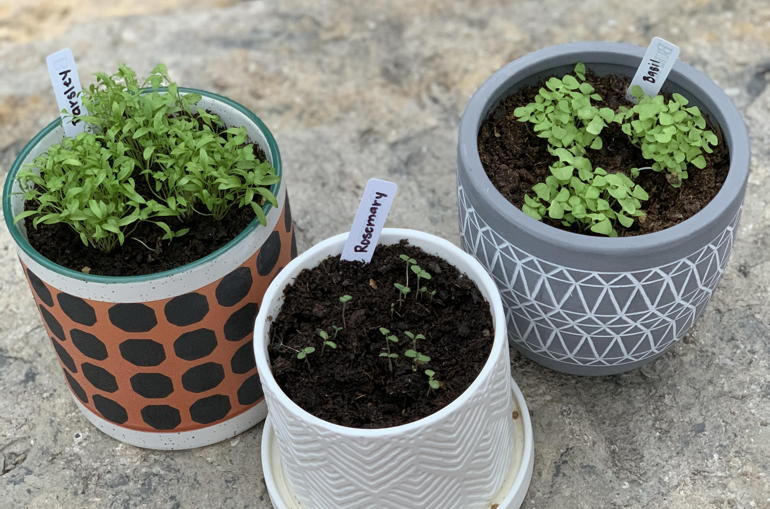
Let’s start with a little farm DYK (Did You Know?):
According to kcfoodcircle.org, there are 16 registered farmers markets in the metro area (including Lawrence). On their website, they also list all of the farms ready to sell within a 120-mile radius. Consumers can find contact info, types of farms, where to buy, and specialty items.
Cultivatekc.org is a non profit whose mission is to grow food, farms, and community in support of a sustainable food system for all. Advocacy for urban food growth and access are values at the core of what they do.
Catholic Charities of Northeast Kansas and Cultivate KC partner for a program called New Roots for Refugees. The goal of the program is to train refugees to farm, become independent business people, and ultimately support themselves through a farming business. Their four-year training program includes classes, workshops, a quarter-acre plot to farm, access to farmers markets as selling tools, and much more. There are currently 16 farmers training at Juniper Gardens Training Farm, just minutes from downtown.
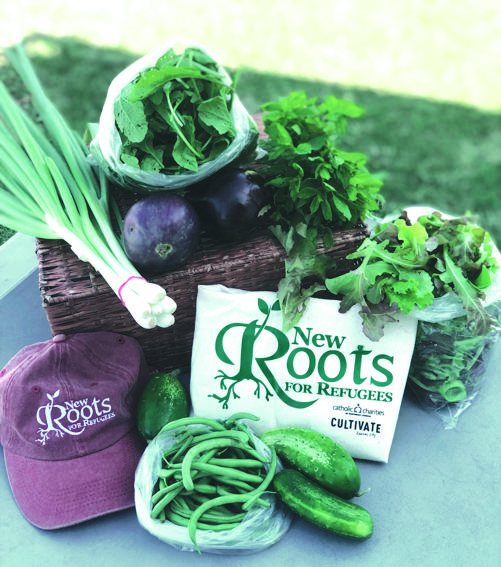
The phrase “farm to table” incorporates the following:
-
- Community Supported Agriculture (CSA)
- Farmers Markets
- Food Traceability (origin of food source made known to consumer)
- Food Safety
- Environmental Benefits
CSAs (community supported agriculture) lets us dive a little deeper into the methods of placing farm-grown produce on our own tables without the supply chain and logistics in the middle, as is usually the case with grocery stores. Here are the basics on how it works: a farmer offers a certain number of “shares” of a harvest to the public. A share would typically consist of a box of a variety of vegetables, and the consumer would subscribe to a certain number of boxes to be received through the growing season. There are probably as many CSAs to choose from as there are types of tomatoes, so choose with some guidance. Localharvest.org is a site that covers most major U.S. cities, and they offer tips and tricks to finding the right CSA. They also list farms, farmers markets, and events such as berry picking in an area.
Delving a bit deeper yet, we can find more information regarding the inner workings of how some local special populations are cultivating a love of fresh food in our urban and suburban confines, as well as the topic of produce distribution.
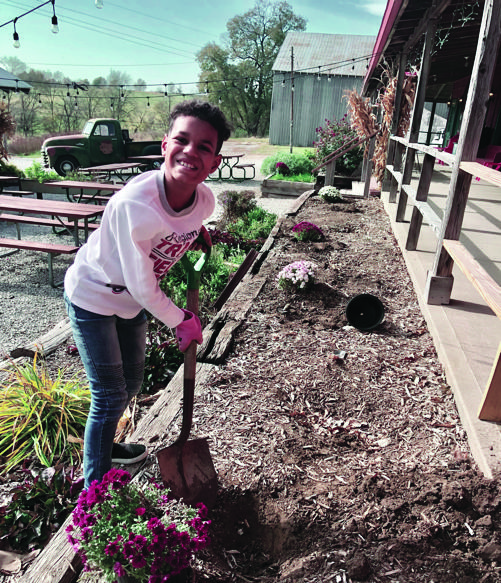
Greg Vasquez enjoyed planting in the garden.
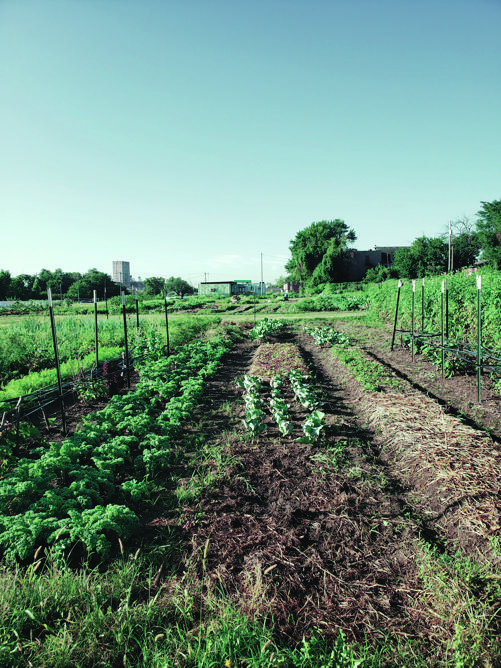
With the introduction of COVID-19 into the food supply chain, creative solutions are being applied. One such local group being affected by social distancing is the special needs young adults served by The Farmer’s House. This non profit serves a variety of ages of individuals with developmental disabilities by training them on a working farm, where they learn the skills of planting, harvesting, packaging, and selling their grown goods. Social distancing has made it difficult, but not impossible to keep these “farmers” busy and productive. Dana Chatlin, director of development, said, “Virtual farming can be done, but it requires the help of dedicated volunteers and staff,” as they still train their farmers, but through video learning and practicing planting at home.
Another unique population being escorted through the farming process during trying times is the group of Shawnee Mission School District students who are enrolled in the Broadmoor Urban Farm program through the Center for Academic Achievement. Students benefit from an urban farm concept initiated by faculty in the Culinary Arts and Hospitality program, whereby they cultivate food to be included in the District’s award-winning Broadmoor Bistro. Bob Brassard, chef and Broadmoor Bakery and Urban Farm manager, stated, “Our students learn to plant, harvest, package, sell, and use the items they grow. What starts out as an heirloom tomato seed might turn into a spicy salsa used in the Bistro. We are involved in the business of promoting self-esteem, not just cooking.” Students also learn how to forge relationships with local markets and restaurants that purchase and use the products grown. (Next time you are in Bella Napoli or Rye, ask about their partnership with Broadmoor Urban Farm.)
Partnerships are really the essence of successful food distribution. Probably the largest local and regional partner in the field of produce is C&C Produce, in North Kansas City. This locally-owned company has been awarded a contract through the USDA during COVID-19, to process thousands of boxes of fresh produce and make them available for those who need it most. Non profits, schools, food banks, places of worship, and more are encouraged to apply. The process is quite simple, visit ccproduce.net and fill out a brief application. When approved, at no cost to the agency, fresh food will be delivered via C&C’s existing network. Harvesters, The Community Food Network has been enriched by this program, as have hundreds of other agencies. The benefits are countless: local and regional farmers have a market for their produce; seasonal produce is distributed and not wasted; and deserving families receive fresh food. As Nick Conforti, C&C co-owner confided, “We will do it right. We have the warehouse, the refrigeration, the vehicles, and the personnel to make it happen and ensure food safety.”
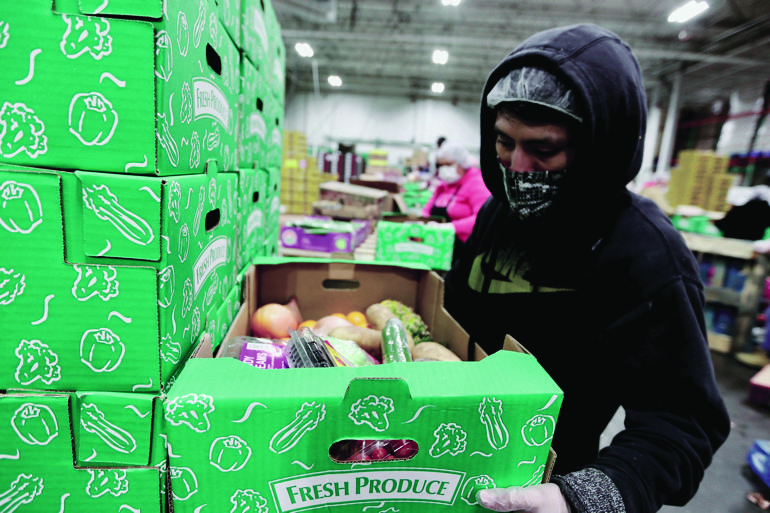
C&C Produce
With a summer of challenges ahead for adults and children, alike, it’s a good idea to start a local food project at home. Plant some seeds, put in a small garden, visit some farmers markets, volunteer at a food bank, check out a working farm, pick some berries or flowers (where permitted), and then make some fun recipes out of the fruits of your labor. Jams, salsas, fresh vegetables, and fruits, pies, and herbs all make great gifts to drop off at neighbors’ and friends’ homes!
Also featured in the June 13, 2020 issue of The Independent
By Anne Potter Russ